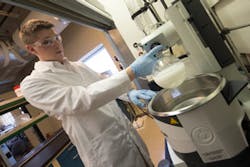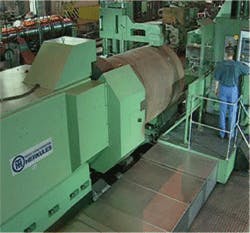Expansion Management: Why German Companies Feel at Home in Pittsburgh
When half of the 20 largest German-owned companies have a presence in one city, you have to ask why.
Why is Pittsburgh home to 170 German companies, 75 of which are manufacturers? With numbers that large, including a workforce of 11,000, it can safely be said that it’s not a coincidence.
There are a number of factors: a strong workforce with a history of skills in specific areas in which German companies excel, topography that feels like home to German ex-pats, and similar cultural values. But the one that stands out is the ability to combine the reputations of the two countries into a strong product offering.
“All of our products have the line ‘German Engineered – American Made’,“explains Mark Haley, president, Hörmann Flexon LLC. “This line delineates the quality of our products in a location where our market is growing,” he said.
In the past three years, this manufacturer of high speed roll up doors, has doubled production. In fact when they began constructing a new facility in 2012, Christoph Hörmann, managing partner for Hörmann Flexon LLC, said that “now is the time to be successful in the U.S.”
Know-how is a key component as to why German companies are successful in this region. Workforce longevity both in terms of tenure of service and manufacturing skills can be traced back to the stronghold of the steel and chemical industries in the region. In fact one of the area’s top employers is Bayer MaterialScience who opened up shop in Pittsburgh in the 50s. Currently the company operates R&D centers in the region focusing on polymers, plastics, industrial chemicals and energy conversion.
Bayer is very committed to Pittsburgh, explains Rebecca Lucore, chief of staff, Bayer MaterialScience LLC. In fact the company needs to add 40-60 people per year for the next 10 years to replace retiring workers.
As employees from Pittsburgh tend to build their careers in the city, Bayer is specifically targeting employees native to the area. And they have some very clever ways to do this. In addition to the usual recruiting from area educational institutions such as Carnegie Mellon and University of Pittsburgh, the company has figured out a way that goes straight to the heart of a Millennial—social activism.
“We want employees in the early career stage to feel connected to the region,” Lucore explains. “Our goal is for them to be involved with organizations outside of the Bayer walls. We achieve this through our Employee Engagement Academy which uses skill-based volunteerism. They work at nonprofit organizations on real issues using hours allotted for paid time off to volunteer.” At the end of this fall over 45 employees will have put in 900 hours.
It’s a smart strategy as a study done in 2011 showed that 70% of Millennials consider themselves social activists with 75% taking the view that corporations “should create economic value for society for addressing its needs.”
Competition for Talent
Even with a progressive attitude however, Bayer is preparing for the competition for talent it will face given the boon in the energy industry. “We consider the competition to be healthy for the region as we are attracting a lot of STEM talent,” Lucore says.
The talent flocking to the Pittsburgh is arriving to fill the jobs related to all of the industries created around the Marcellus shale. Shell is building a large petrochemical plant and other industries are popping up, or expanding to produce products based on the new energy source.
With abundant employment opportunities companies must figure out how to hold onto employees. One company that is doing a good job, with high retention rates, uses the training methods known to give German companies a workforce advantage. While the U.S. headquarters of the Hekules Group is based in Ford City, Pa. the close relationship it has with its German-based parent company creates a synergy that produces a manufacturing environment of continuous improvement. American workers are trained in German production facilities.
Herkules North America Corp is comprised of Herkules USA which produces high-quality roll machining technology and HCC/KPM which produces machine controls and measuring technology. “With the fast pace of innovation today, we feel it’s especially important for our American workforce to meet face-to-face with our German workforce and exchange ideas, “says Jacob Scheiffarth, plant manager at Herkules USA. “
"As there are many plants in our organization, we take the time each visit to Germany to benchmark a number of them to pick up best practices.”
One particular 'best practice' that is especially apparent in German manufacturing is the pride in the craftsmanship of the work. “Manufacturing is an honored profession in Germany,” says Scheiffarth. By keeping a close relationship between their German and U.S .operations this pride is transferred stateside. The company's strong apprenticeship program with area educational institutions also reinforces this cross-continent training.
Another organization that reinforces the pride of German manufacturing is the German American Business Council. “As I travel back and forth to Germany, seeking new opportunities for the region, I can point to the success that German companies have had for many years in the region, “says Jeffrey Dean, managing partner, BKD, LLP and an executive committee member of the Council.
“Support on an executive level is strong within a group I created six years ago of area CEOs that meet monthly to discuss a variety of issues. Once located in this area German companies rarely move elsewhere, “Dean added.
Attraction to the area takes many forms. “Physically the topography is very similar to Germany," explains Suzi Pegg, global marketing, Alleghany Pittsburgh Regional Alliance. “The same is true of the culture and even the architecture which feels familiar to the ex-pats. Many Germans feel so much at home here that many are happy to stay permanently.“
From an economic standpoint, the current and future appeal of the area’s booming energy industry is attracting many companies. For Bayer, with a large global imprint, the cost of energy is a major factor in site selection.
“We are actively recruiting German companies that are in the downstream of the shale supply chain,“says Dee Peart, president, Pittsburgh Regional Alliance. “Additionally our supply of fresh water is attracting companies who are innovative in that space.”
Pittsburgh’s fascination with German companies is based on sound economic policy. “One of the great things about working with German companies is their long-term vision,“says Haley.
“When they choose a site they will do everything they can to make the site profitable for the long haul," Haley added. "They look at ROIs over years and view payback on investments, such as equipment, in a much longer time frame that other companies might.
“German companies look for what they are going to leave their children rather than their shareholders,” noted Haley.



